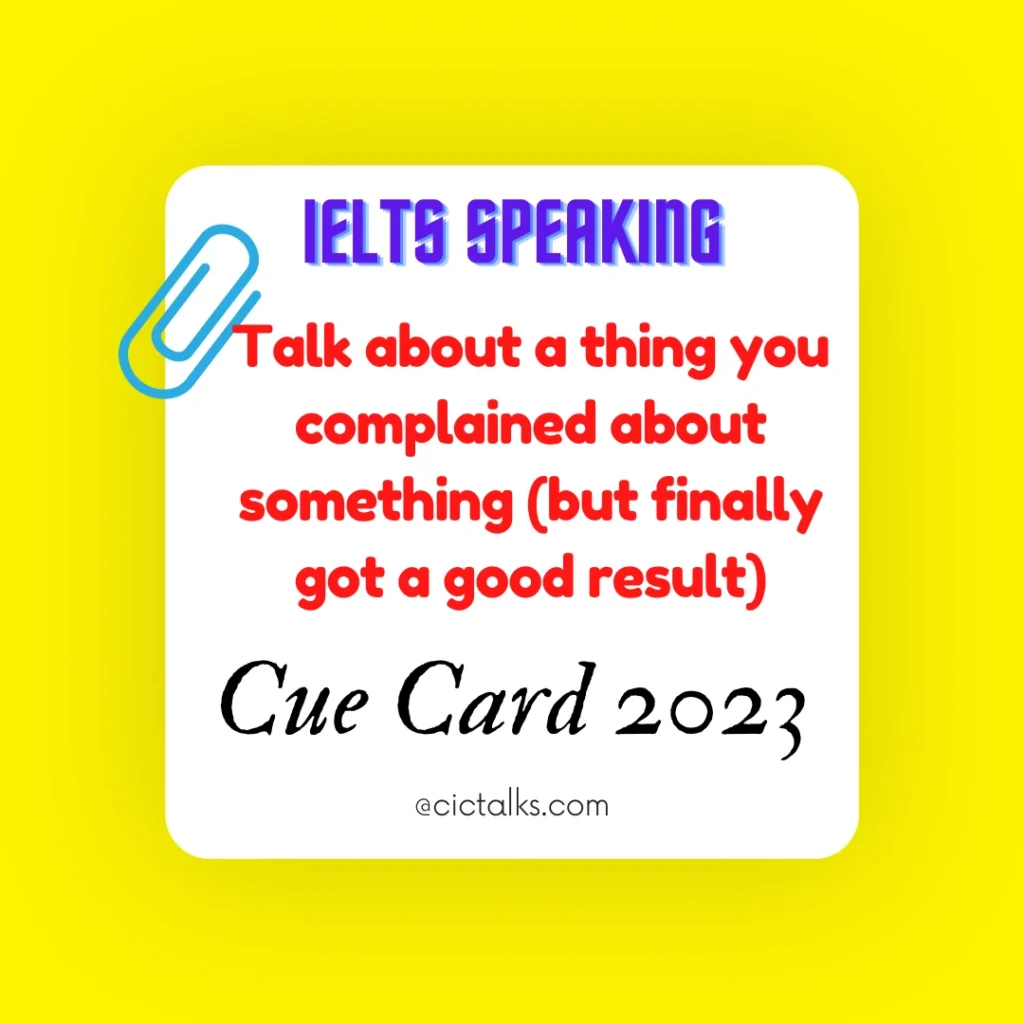Talk about a thing you complained about something (but finally got a good result) IELTS Cue Card
In Talk about a thing you complained about something (but finally got a good result) IELTS Speaking Cue Card and follow-ups, You need to answer questions such as:
- What did you complain about?
- Who you complained to?
- When did it happen?
- What was the result and why you were satisfied with the result?

Read Talk about a thing you complained about something (but finally got a good result) IELTS Cue Card sample answer given below, and carefully observe the usage of band 7+ vocabulary in the model answer and follow-up questions.
Introduction
I’m not the type of person that likes to moan a lot. However, I believe that it is my responsibility to address mistakes when they are made because raising awareness of them will prevent them from happening again. Today, I want to discuss an instance in which I complained about service and eventually got it fixed.
ALSO READ: IELTS Speaking JAN-APR 2023 Cue Cards
What did you complain about? & When did it happen?
It happened last week when I put forward a complaint about a product as well as the service I received. I bought a new washing machine. Although I asked them to fix it immediately because I needed it, the service personnel did not appear overly concerned.
Who you complained to?
So I reach out to the company and express my dissatisfaction. They called me back right away and promised to take stern measures in response to my complaint. Fortunately, the company investigated the issue and find that there was a problem with the product model specifically. That’s how I learned that this problem was causing a lot of other people to experience similar hardship.
What was the result and why you were satisfied with the result?
In my case, the company offered a refund or replacement of the product to resolve the issue and ensured my full satisfaction. Moreover, the service technician immediately arrived at my home and expressed regret and assured me that he handle complaints more professionally going forward.
Concluding the cue card
So, this was a situation where I complained and got a favourable outcome.
Talk about a thing you complained about something (but finally got a good result) Follow-up questions
Here are the follow-up questions that may be asked on the IELTS Speaking cue card topic ‘Talk about a thing you complained about something (but finally got a good result)‘:
When do people usually complain?
People frequently voice their complaints when they feel their requirements or expectations have not been met, when they have received subpar service or a subpar product, or when they have had a bad experience. Typical scenarios where people might grumble include:
- When a product is flawed or not performing as intended
- After experiencing subpar customer service
- Whenever a person feels that they have been treated unfairly or unjustly
- When they object to a company’s decision or policy
- When they want to draw attention to a problem that they feel is crucial When they wish to look for redress or recompense for their displeasure
Can complaining help solve problems?
While complaining may draw attention to an issue, it is not always a practical solution. It is crucial to also act and make an effort to discover a solution. Additionally, rather than merely whining, it could be more beneficial to express concerns and make useful suggestions.
What other measures you should take to solve problems rather than complain?
Instead of complaining, there are a number of steps that can be taken, such as:
- Locating the problem’s underlying causes, Recognizing the issue’s root cause and taking action to fix it.
- Information gathering to better grasp the issue, amass as much knowledge as you can about it.
- Brainstorming solutions to make a list of feasible solutions to the issue and assess each one.
- Select the best course of action and put it into practise.
What kind of people complain more?
Nobody has a certain personality type that complains more than others. People from all backgrounds and walks of life may grumble in certain circumstances. However, research indicates that certain people may be more prone to complaining due to particular personality traits or features. People who are more neurotic or have a propensity for pessimism, for instance, may complain more frequently, according to certain studies. People with a strong need for control could also complain more frequently.
Do you usually get angry?
No, I don’t get furious very often. But there are times when I get irritated and lose my cool, as when I witness someone speaking ill or doing something unacceptable. I get upset when I watch hate speech on news channels.
Do you think customers’ complaints will improve products or services?
Definitely, yes. Nowadays, every business has consumers as their top priority. If someone complains, they take it seriously and work to make things better. They can only keep their consumers loyal if they wilfully address their concerns.
Is it necessary for companies to set up customer service?
Yes, setting up customer service is typically thought to be a requirement for businesses. Any firm should prioritise providing excellent customer service because it fosters and sustains client loyalty. It also helps to respond quickly and effectively to client complaints and issues. A strong customer care team may boost client retention, lower the frequency of complaints from customers, and raise customer happiness.
Final Thoughts on IELTS Speaking Cue Card Topic
I hope it gives you some realistic idea on how to carry a conversation around Talk about a thing you complained about something (but finally got a good result) IELTS Cue card topic.
If you still need any help, feel free to ask in the comments.
HERE’S ONE MORE Describe an achievement/success you are proud of IELTS Cue Card THAT YOU MUST READ!
ALL THE BEST!

![IELTS Speaking Part 1 - NEW ACTIVITIES [Answers + Band 9 Vocabulary]](https://cictalks.com/wp-content/uploads/2021/08/IELTS-Speaking-Part-1-NEW-ACTIVITIES--390x205.jpeg)

![IELTS Speaking Part 1 Topic - TREES [Q&A, Band 9 Vocabulary]](https://cictalks.com/wp-content/uploads/2021/08/IELTS-Speaking-task-Part-1-Topic-TREES--390x205.jpeg)